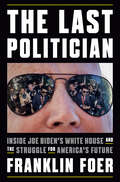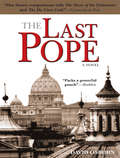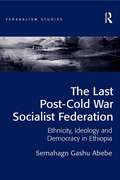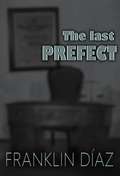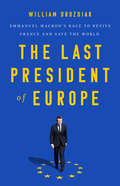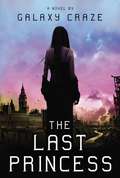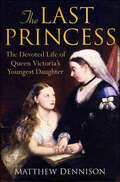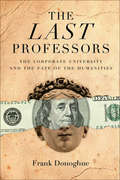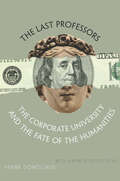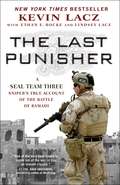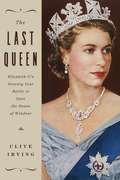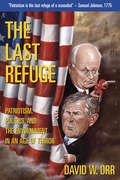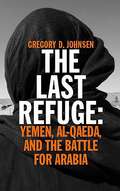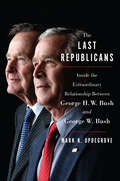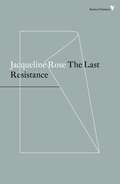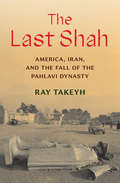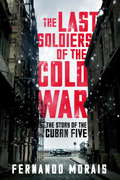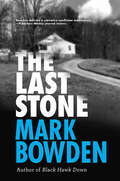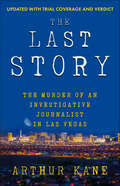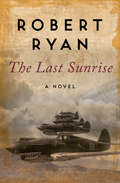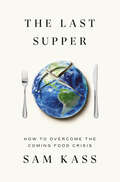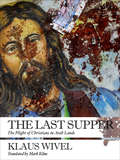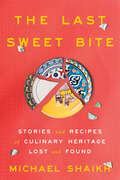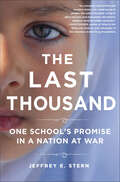- Table View
- List View
The Last Politician: Inside Joe Biden's White House and the Struggle for America's Future
by Franklin FoerThe New York Times bestsellerFranklin Foer tells the definitive insider story of the first two years of the Biden presidency, with exclusive access to Biden&’s longtime team of advisers, and presents a gripping portrait of a president during this momentous time in our nation&’s history."You might love Biden or you might hate Biden, but either way, if you want to understand him, you will want to buy this book." —Politico&“A triumph of reporting.&” — Geoff Bennett, PBS NewsHour &“Deeply reported . . . a terrific read.&” —Chuck Todd, Meet the Press&“Fantastic . . . The first real insider account of the Biden White House and a fascinating read about Biden himself.&” —Jon Favreau, Pod Save AmericaOn January 20, 2021, standing where only two weeks earlier police officers had battled with right-wing paramilitaries, Joe Biden took his oath of office. The American people were still sick with COVID-19, his economists were already warning him of an imminent financial crisis, and his party, the Democrats, had the barest of majorities in the Senate. Yet, faced with an unprecedented set of crises, Joe Biden decided he would not play defense. Instead, he set out to transform the nation. With unparalleled access to the tight inner circle of advisers who have surrounded Biden for decades, Franklin Foer dramatizes in forensic detail the first two years of the Biden presidency, concluding with the historic midterm elections. The result is a gripping and high-definition portrait of a major president at a time when democracy itself seems imperiled.The Last Politician is a landmark work of political reporting—which includes thrilling, blow-by-blow insider reports of the botched withdrawal from Afghanistan and the White House&’s swift response to the Russian invasion of Ukraine—that is destined to shape history&’s view of a president in the eye of the storm.
The Last Pope
by David OsbornIn the tradition of the classic bestseller The Shoes of the Fisherman, this evocative and moving novel takes you deep inside the inner world of the Vatican and the American branch of the Holy See to dramatize the great moral issues dividing the Church. The passing of humble and beloved Pope Gregory XVIII brings the Lords of the Church to the Basilica of St. Peter in Rome to meet in its secret recesses and elect a new pope. They find they must choose between a caring, but guilt-ridden, American cardinal (the very same young priest who made a heart-rending confession so many years ago) who would bring reforms to the Church, or a cardinal whose soul belongs to the Inquisition. At stake is the future of the Church itself.
The Last Post-Cold War Socialist Federation: Ethnicity, Ideology and Democracy in Ethiopia (Federalism Studies)
by Semahagn Gashu AbebeAfter the fall of the Berlin wall and the disintegration of the former USSR and Yugoslavia, it has widely been assumed that socialist federations have become a thing of the past. Ethiopia’s ethnic federal system however is essentially a socialist federal system based on the notion of the ’right to self-determination of nationalities’ and a Marxist-Leninist organization of the state and party. This book assesses the Ethiopian ethnic federal system from the perspective of the principles of socialist federations and other Marxist oriented policies pursued by the ruling Ethiopian Peoples' Revolutionary Democratic Front (EPRDF). Exploring how the application of these ideological principles has impacted on the structure and function of the Ethiopian federal system, the research examines the ways in which these ideological policies of the ruling party affect national consensus, protection of human rights, the rights of minority groups, separation of power principles and the relationship between the federal and regional governments. It also explores the extent to which ideological principles have had an impact on the democratization process, rule of law and in building up institutions such as parliamentary democracy, the judiciary, the media and civil society organizations in the country. Approaching the Ethiopian federal system from the perspective of the fundamental ideological principles of the party in power allows a deeper insight into the structure and function of the ethnic federal system.
The Last Prefect
by Franklin A. Díaz LárezOn 31 December 2001, Venezuela’s prefectures were finally abolished. The prefectures were institutions regulated by a law that was unconstitutional, unjust and immoral: the vagrancy law. This was a legal framework which authorised prefects to arrest and detain people for up to seventy-two hours, or have them interned indefinitely and without sentencing in abhorrent prison camps. This law had been inherited from Venezuela’s last dictatorship, that of General Marcos Pérez Jiménez, which had copied it, almost to the letter, from another enforced in Spain under the dictatorship of Franco. Under its terms, anyone with no known occupation could be considered a vagrant, and so be subject to sanction by the prefects. Homosexuals were also placed in this category. Inexplicably, even though the judicial and ethical underpinnings of the law bordered on the absurd, it remained in full force, and the civil servants working within its remit had no authority to refuse to enforce it. As long as it remained in operation, prefects were required to respect it, comply with it, and ensure the public’s compliance. As luck – or misfortune – would have it, I was one of the last of those prefects. These are my memories of some of the most surprising cases I had to contend with.
The Last President of Europe: Emmanuel Macron's Race to Revive France and Save the World
by William DrozdiakA revelatory examination of the global impact of Emmanuel Macron's tumultuous presidency.A political novice leading a brand new party, in 2017 Emmanuel Macron swept away traditional political forces and emerged as president of France. Almost immediately he realized his task was not only to modernize his country but to save the EU and a crumbling international order. From the decline of NATO, to Russian interference, to the Gilets Jaunes (Yellow Vest) protestors, Macron's term unfolded against a backdrop of social conflict, clashing ambitions, and resurgent big-power rivalries.In The Last President of Europe, William Drozdiak tells with exclusive inside access the story of Macron's presidency and the political challenges the French leader continues to face. Macron has ridden a wild rollercoaster of success and failure: he has a unique relationship with Donald Trump, a close-up view of the decline of Angela Merkel, and is both the greatest beneficiary from, and victim of, the chaos of Brexit across the Channel. He is fighting his own populist insurrection in France at the same time as he is trying to defend a system of values that once represented the West but is now under assault from all sides. Together these challenges make Macron the most consequential French leader of modern times, and perhaps the last true champion of the European ideal.
The Last Princess
by Galaxy CrazeHappily ever after is a thing of the past.A series of natural disasters has decimated the earth. Cut off from the rest of the world, England is a dark place. The sun rarely shines, food is scarce, and groups of criminals roam the woods, searching for prey. The people are growing restless.When a ruthless revolutionary sets out to overthrow the crown, he makes the royal family his first target. Blood is shed in Buckingham Palace, and only sixteen-year old Princess Eliza manages to escape. Determined to kill the man who destroyed her family, Eliza joins the enemy forces in disguise. She has nothing left to live for but revenge, until she meets someone who helps her remember how to hope-and love-once more.Now she must risk everything to ensure that she does not become . . .The Last Princess.
The Last Princess: The Devoted Life of Queen Victoria's Youngest Daughter
by Matthew DennisonAn engrossing biography of Queen Victoria's youngest daughter that focuses on her relationship with her willful mother--a powerful and insightful look into two women of significant importance and influence in world history.Beatrice was the last child born to Queen Victoria and Prince Albert. Her father died when she was four and Victoria came to depend on her youngest daughter absolutely, and also demanded from her complete submission. Victoria was not above laying it down regally even with her own children. Beatrice succumbed to her mother's obsessive love, so that by the time she was in her late teens she was her constant companion and running her mother's office, which meant that when Victoria died her daughter became literary executor, a role she conducted with Teutonic thoroughness. And although Victoria tried to prevent Beatrice even so much as thinking of love, her guard slipped when Beatrice met Prince Henry of Battenberg. Sadly, Beatrice inherited from her mother the hemophilia gene, which she passed on to two of her four sons and which her daughter Victoria Eugenia, in marrying Alfonso XIII of Spain, in turn passed on to the Spanish royal family. This new examination will restore her to her proper prominence--as Queen Victoria's second consort.
The Last Professors: The Corporate University and the Fate of the Humanities
by Frank Donoghue“What makes the modern university different from any other corporation?” asked Columbia’s Andrew Delbanco recently in the New York Times. “There is more and more reason to think: less and less,” he answered. In this provocative book, Frank Donoghue shows how this growing corporate culture of higher education threatens its most fundamental values by erasing one of its defining features: the tenured professor. Taking a clear-eyed look at American higher education over the last twenty years, Donoghue outlines a web of forces—social, political, and institutional—dismantling the professoriate. Today, fewer than 30 percent of college and university teachers are tenured or on tenure tracks, and signs point to a future where professors will disappear. Why? What will universities look like without professors? Who will teach? Why should it matter? The fate of the professor, Donoghue shows, has always been tied to that of the liberal arts —with the humanities at its core. The rise to prominence of the American university has been defined by the strength of the humanities and by the central role of the autonomous, tenured professor who can be both scholar and teacher. Yet in today’s market-driven, rank- and ratings-obsessed world of higher education, corporate logic prevails: faculties are to be managed for optimal efficiency, productivity, and competitive advantage; casual armies of adjuncts and graduate students now fill the demand for teachers. Bypassing the distractions of the culture wars and other “crises,” Donoghue sheds light on the structural changes in higher education—the rise of community colleges and for-profit universities, the frenzied pursuit of prestige everywhere, the brutally competitive realities facing new Ph.D.s —that threaten the survival of professors as we’ve known them. There are no quick fixes in The Last Professors; rather, Donoghue offers his fellow teachers and scholars an essential field guide to making their way in a world that no longer has room for their dreams.
The Last Professors: The Corporate University and the Fate of the Humanities, With a New Introduction
by Frank Donoghue“What makes the modern university different from any other corporation?” asked Columbia’s Andrew Delbanco recently in the New York Times. “There is more and more reason to think: less and less,” he answered.In this provocative book, Frank Donoghue shows how this growing corporate culture of higher education threatens its most fundamental values by erasing one of its defining features: the tenured professor.Taking a clear-eyed look at American higher education over the last twenty years, Donoghue outlines a web of forces—social, political, and institutional—dismantling the professoriate. Today, fewer than 30 percent of college and university teachers are tenured or on tenure tracks, and signs point to a future where professors will disappear. Why? What will universities look like without professors? Who will teach? Why should it matter? The fate of the professor, Donoghue shows, has always been tied to that of the liberal arts —with thehumanities at its core. The rise to prominence of the American university has been defined by the strength of the humanities and by the central role of the autonomous, tenured professor who can be both scholar and teacher. Yet in today’s market-driven, rank- and ratings-obsessed world of higher education, corporate logic prevails: faculties are to be managed for optimal efficiency, productivity, and competitive advantage; casual armies of adjuncts and graduate students now fill the demand for teachers.Bypassing the distractions of the culture wars and other “crises,” Donoghue sheds light on the structural changes in higher education—the rise of community colleges and for-profit universities, the frenzied pursuit of prestige everywhere, the brutally competitive realities facing new Ph.D.s —that threaten the survival of professors as we’ve known them. There are no quick fixes in The Last Professors; rather, Donoghue offers his fellow teachers and scholarsan essential field guide to making their way in a world that no longer has room for their dreams.First published in 2008, "The Last Professors" have largely had its arguments borne out in the interim, as the percentage of courses taught by tenured professors continues to dwindle. This new edition includes a substantial Preface that elaborates on recent developments and offers tough but productive analysis that will be crucial for today's academics to heed.
The Last Punisher: A SEAL Team THREE Sniper's True Account of the Battle of Ramadi
by Kevin Lacz Ethan E. Rocke Lindsey Lacz&“One of the very best books to come out of the war in Iraq,&” (Lt. Col. Dave Grossman, bestselling author of On Killing), The Last Punisher is a gripping and intimate on-the-ground memoir from a Navy SEAL who was part of SEAL Team THREE with American Sniper Chris Kyle. Experience his deployment, from his first mission to his first kill to his eventual successful return to the United States to play himself in the Oscar-nominated film directed by Clint Eastwood and starring Bradley Cooper.The Last Punisher is a “thoughtful, funny, and raw…always compelling” (Bing West, New York Times bestselling author of No True Glory) first-person account of the Iraq War. With wry humor and moving testimony, Kevin Lacz tells the bold story of his tour in Iraq with SEAL Team THREE, the warrior elite of the Navy. This legendary unit, known as “The Punishers,” included Chris Kyle (American Sniper), Mike Monsoor, Ryan Job, and Marc Lee. These brave men were instrumental in securing the key locations in the pivotal 2006 Battle of Ramadi. Minute by minute, Lacz relays the edge-of-your-seat details of his team’s missions in Ramadi, offering a firsthand glimpse into the heated combat, extreme conditions, and harrowing experiences they faced every day. Through it all, Lacz and his teammates formed unbreakable bonds and never lost sight of the cause: protecting America with their fight. “A rare glimpse into the mind of a Navy SEAL,” (Clint Emerson, New York Times bestselling author of 100 Deadly Skills) Kevin Lacz brings you onto the battlefield and relays the tough realities of war. At the same time, Lacz shares how these experiences made him a better man and how proud he is of his contributions to one of this country’s most difficult military campaigns. The Last Punisher is the story of a SEAL and an “honest-to-God American hero” (Mike Huckabee, #1 bestselling author) who was never afraid to answer the call.
The Last Queen: Elizabeth II's Seventy Year Battle to Save the House of Windsor
by Clive IrvingA timely and revelatory new biography of Queen Elizabeth (and her family) exploring how the Windsors have evolved and thrived, as the modern world has changed around them. Clive Irving&’s stunning new narrative biography The Last Queen probes the question of the British monarchy&’s longevity. In 2021, the Queen Elizabeth II finally appears to be at ease in the modern world, helped by the new generation of Windsors. But through Irving&’s unique insight there emerges a more fragile institution, whose extraordinarily dutiful matriarch has managed to persevere with dignity, yet in doing so made a Faustian pact with the media. The Last Queen is not a conventional biography—and the book is therefore not limited by the traditions of that genre. Instead, it follows Elizabeth and her family&’s struggle to survive in the face of unprecedented changes in our attitudes towards the royal family, with the critical eye of an investigative reporter who is present and involved on a highly personal level.
The Last Refuge: Patriotism, Politics, and the Environment in an Age of Terror
by David W. Orr"Patriotism is the last refuge of scoundrels" -SAMUEL JOHNSON, 1775 "a tightly reasoned, excellently written book that should be lethally effective in helping readers who aren't experts understand the contours of the crisis." -TOLEDO BLADE Updated and revised following the 2004 elections, The Last Refuge describes the current state of American politics against the backdrop of mounting ecological and social problems, the corrosive influence of money, the corruption of language, and the misuse of terrorism as a political issue. Setting out an agenda that transcends conventional ideological labels, David Orr contends that partisan wrangling is only a symptom of a deeper dysfunction: The whole political machinery that connects Americans' fundamentally honorable ideals with public policy is broken. The book offers a withering critique of the failings of the Bush administration, supplemented by new essays that look at the national-level dominance of the Republican Party and examine the fallacy that the evangelical right represents a Christian majority. After analyzing the challenges of reforming the current system, Orr offers an empowering vision of a second American Revolution that peaceably achieves sustainability and charts a hopeful course for forward-looking citizens.
The Last Refuge: Yemen, al-Qaeda, and the Battle for Arabia
by Gregory D. Johnsen'Exhausted and on the run, it looked like the end for the small band of men. Looking at the few who had followed him into the desert, Muhammad said, "When disaster threatens, seek refuge in Yemen"... Yemen was the last refuge.' Far from the battlefields of Iraq and Afghanistan, in an unforgiving corner of Arabia, the US and al-Qaeda are fighting a clandestine war of drones and suicide bombers. The battles began in 2006, when twenty-three men tunnelled out of a maximum-security prison in Yemen's capital to their freedom. Later they were joined by a dozen men released from Guantánamo Bay. Together, they formed the core of al-Qaeda on the Arabian Peninsula - and now they and their recruits stand ready to hijack the Arab Spring, from the streets of Syria to hotspots much closer to home. In The Last Refuge, al-Qaeda scholar Gregory D. Johnsen charts the rise, the fall, and the ultimate resurrection of al-Qaeda in Yemen - given new life through a combustion of civil wars, Afghan refugees, and Muhammad's prophetic teachings. Johnsen brings us inside al-Qaeda's training camps and safe houses as the terrorists plot poison attacks and debate how to bring down a plane on Christmas Day. Based on years of on-the-ground interviews and never-before-translated al-Qaeda battle notes, he delivers a riveting and incisive investigation of the state of the Middle East.
The Last Republicans: Inside the Extraordinary Relationship Between George H.W. Bush and George W. Bush
by Mark K. UpdegroveA groundbreaking look at the lives of George H. W. Bush and George W. Bush, the most consequential father-son pair in American history, often in their own words. In this revealing, often poignant work, presidential historian Mark K. Updegrove tracks the two Bush presidents from their formative years through their post-presidencies and the failed presidential candidacy of Jeb Bush, derailing the Bush presidential dynasty. Drawing extensively on exclusive access and interviews with both Bush presidents, Updegrove reveals for the first time their influences and perspectives on each other’s presidencies; their views on family, public service, and America’s role in the world; and their unvarnished thoughts on Donald Trump and the radical transformation of the Republican Party he now leads.In 2016 George W. Bush lamented privately that he might be “the last Republican president.” Donald Trump’s election marked the end not only to the Bushes’ hold on the White House, but of a rejection of the Republican principles of civility and international engagement and leadership that the Bushes have long championed.The Last Republicans offers illuminating, moving portraits of the forty-first and forty-third presidents, as well as an elegy for the Republican “establishment,” which once stood for putting the interests of the nation over those of any single man.
The Last Resistance
by Jacqueline RoseA bravura exploration of politics and writing in dark times In The Last Resistance, Jacqueline Rose explores the power of writing to create and transform our political lives. In particular, she examines the role of literature in the Zionist imagination: here, literature is presented as a unique form of dissidence, with the power to expose the unconscious of nations, and often proposing radical alternatives to their dominant pathways and beliefs. While Israel–Palestine is the repeated focus, The Last Resistance also turns to post-apartheid South Africa, to American national fantasy post-9/11, and to key moments for the understanding of Jewish culture and memory. Rose also underscores the importance of psychoanalysis, both historically in relation to the unfolding of world events, and as a tool of political understanding. Examining topics ranging from David Grossman, through W.G. Sebald, Freud, Nadine Gordimer, the concept of evil, and suicide bombers, The Last Resistance offers a unique way of responding to the crises of the times.
The Last Romantic: A Biography of Queen Marie of Roumania
by Hannah PakulaThis book is about why a woman, much less a Queen, who was a symbol of success and beauty in her own generation, should have fallen into obscurity and even disrepute within fifty years of her death.
The Last Shah: America, Iran, and the Fall of the Pahlavi Dynasty (Council on Foreign Relations Books)
by Ray TakeyhThe surprising story of Iran&’s transformation from America&’s ally in the Middle East into one of its staunchest adversaries Offering a new view of one of America&’s most important, infamously strained, and widely misunderstood relationships of the postwar era, this book tells the history of America and Iran from the time the last shah, Mohammad Reza Pahlavi, was placed on the throne in 1941 to the 1979 revolution that brought the present Islamist government to power. This revolution was not, as many believe, the popular overthrow of a powerful and ruthless puppet of the United States; rather, it followed decades of corrosion of Iran&’s political establishment by an autocratic ruler who demanded fealty but lacked the personal strength to make hard decisions and, ultimately, lost the support of every sector of Iranian society. Esteemed Middle East scholar Ray Takeyh provides new interpretations of many key events—including the 1953 coup against Prime Minister Mohammad Mossadeq and the rise of Ayatollah Ruhollah Khomeini—significantly revising our understanding of America and Iran&’s complex and difficult history.
The Last Soldiers of the Cold War
by Fernando MoraisHere is the story of political prisoners finally freed in December 2014, after being held captive by the United States since the late 1990s. Through the 1980s and 1990s, violent anti-Castro groups based in Florida carried out hundreds of military attacks on Cuba, bombing hotels and shooting up Cuban beaches with machine guns. The Cuban government struck back with the Wasp Network--a dozen men and two women--sent to infiltrate those organizations.The Last Soldiers of the Cold War tells the story of those unlikely Cuban spies and their eventual unmasking and prosecution by US authorities. Five of the Cubans received long or life prison terms on charges of espionage and murder. Global best-selling Brazilian author Fernando Morais narrates the riveting tale of the Cuban Five in vivid, page-turning detail, delving into the decades-long conflict between Cuba and the US, the growth of the powerful Cuban exile community in Florida, and a trial that eight Nobel Prize winners condemned as a travesty of justice.The Last Soldiers of the Cold War is both a real-life spy thriller and a searching examination of the Cold War's legacy.From the Trade Paperback edition.
The Last Stone: A Masterpiece Of Criminal Interrogation
by Mark BowdenThe true story of a cold case, a compulsive liar, and five determined detectives, from the #1 New York Times–bestselling author and &“master journalist&” (The Wall Street Journal). On March 29, 1975, sisters Katherine and Sheila Lyons, ages ten and twelve, vanished from a shopping mall in suburban Washington, DC As shock spread, then grief, a massive police effort found nothing. The investigation was shelved, and the mystery endured. Then, in 2013, a cold case squad detective found something he and a generation of detectives had missed. It pointed them toward a man named Lloyd Welch, then serving time for child molestation in Delaware. The acclaimed author of Black Hawk Down and Hue 1968 had been a cub reporter for a Baltimore newspaper at the time of the original disappearance, and covered the frantic first weeks of the story. In The Last Stone, he returns to write its ending. Over months of intense questioning and extensive investigation of Welch&’s sprawling, sinister Appalachian clan, five skilled detectives learned to sift truth from determined lies. How do you get a compulsive liar with every reason in the world to lie to tell the truth? The Last Stone recounts a masterpiece of criminal interrogation, and delivers a chilling and unprecedented look inside a disturbing criminal mind. &“One of our best writers of muscular nonfiction.&” —The Denver Post &“Deeply unsettling . . . Bowden displays his tenacity as a reporter in his meticulous documentation of the case. But in the story of an unimaginably horrific crime, it&’s the detectives&’ unwavering determination to bring Welch to justice that offers a glimmer of hope on a long, dark journey.&” —Time
The Last Story: The Murder of an Investigative Journalist in Las Vegas
by Arthur KaneTHE LAST STORY: The Murder of an Investigative Journalist in Las Vegas is an exclusive deep dive into a chilling true tale of sex, ambition, retribution, and homicide. Jeff German, a veteran Las Vegas Review-Journal investigative reporter, was no stranger to controversy or the danger of his work. For more than four decades, he wrote stories relentlessly confronting the mob, corrupt politicians, and greedy bureaucrats. As a result, he was often threatened—enough that he and his friend and fellow investigative reporter, Arthur Kane, sometimes joked about reporting on these threats if they were ever acted upon. Then, in the spring of 2022, German received a tip about abuses at a little-known county office. His subsequent investigation unearthed a scandalous, sexually incriminating video of a rising politician, Robert Telles. The resulting stories in the Review-Journal ended Telles's political aspirations. Less than six months later, on September 3, German's lifeless body was discovered outside his home with multiple stab wounds. His dedicated newsroom colleagues, including Kane, vowed to find the killer. In doing so, they exposed the true depths of corruption and malice in Sin City. Meanwhile, the police struggled to identify a suspect until they released a photo of the suspect's vehicle to the media. That tip led them to none other than Robert Telles, who was subsequently arrested. In August 2024, with the national media in attendance at his trial, Telles was convicted of first-degree murder and later sentenced to twenty years in prison. In THE LAST STORY, Kane delivers an intense narrative of courage, betrayal, and the unrelenting quest for justice.
The Last Sunrise: A Novel (The Post-War Trilogy #2)
by Robert RyanThe real history of World War II&’s most daring fighter squadron is the inspiration for this riveting novel of adventure and romance in the Far East Three years after the liberation of Singapore, transport pilot Lee Crane is finally ready to leave. The Berlin airlift is on, and there&’s decent money to be made if you possess both your own plane and a practiced disregard for safety. One last drink with his Indo-Air fly buddies at the Long Bar in Raffles hotel and Crane is gone. Then he sees her: the tall, beautiful redhead he had every reason to believe was dead. If Elsa is alive—and still angry, judging by the sock to the jaw she greets him with—what else might Crane have gotten wrong about the past? In 1941, Lee Crane was a Flying Tiger, one of dozens of American pilots recruited to join the Chinese Air Force in the fight against the Japanese. Wild in the air and on the ground, the Tigers broke hearts all over Burma, and Crane was no different—until he fell in love with a stunning Anglo-Indian widow. But in the chaos of war, Crane lost track of the woman of his dreams, and spent the next seven years convincing himself it wasn&’t meant to be. Now a chance encounter with another long-lost beauty has him ready to plunge back into the past, praying he will come up with a different answer this time. The Last Sunrise is the 2nd book in the Post-War Trilogy, which also includes After Midnight and Dying Day.
The Last Supper: How to Overcome the Coming Food Crisis
by Sam KassA former senior food policy advisor to President Obama breaks down how changing the way we eat can help fix the climate crisis, from rethinking daily habits to investing in new technology.&“Smart, timely, and full of purpose.&”—Michelle Obama&“A wake‑up call for the future of our planet.&”—Chef José Andrés&“An impressively compelling manifesto for food system transformation.&”—Marion NestleAs a chef in high-end restaurants, and later, in the home of then Senator Barack and Michelle Obama, Sam Kass read a lot about how eating organic and buying local was the key to remaking a food system otherwise built on climate-change-causing petroleum. But when he followed the Obamas into the White House, he realized something: While it&’s easy to identify the problems in our spoiled food system, fixing it is not as simple as getting your eggs from the farmers&’ market. Now investing in startups trying to solve the environmental and human challenges of climate change in food and agriculture.In The Last Supper, Kass shares everything he&’s learned, simplifying it all down to what he calls &“The Core Principle&”: Maximize nutrient production while minimizing environmental damage. He lays out an accessible, action-based plan to save the environment, and in turn, ourselves, based on four pillars of change:• Culture: shifting the way we think about and approach the environment as individuals is the foundation of broader change• Policy and legislation: the limited but important role of policy and how change is made on a governmental level and what we can do about it• Business: How to change the businesses that provide the food we eat as the only path to change our food system• Technology: a deep dive into the future with the new and innovative technologies researchers are using to save the environment, from CRISPR and Loam Bio to the magic of mycelium and the secret weapon that is regenerative farmingThrough anecdotes, interviews, and an astounding amount of research, The Last Supper gives us the tools we need to make a difference.
The Last Supper: The Plight of Christians in Arab Lands
by Klaus Wivel&“A compelling story of the ethnic cleansing of Christian communities caught in the crossfire of the Middle East at war . . . Urgent and passionate&” (Kirkus Reviews). In 2013, alarmed by scant attention paid to the hardships endured by the 7.5 million Christians in the Middle East, journalist Klaus Wivel—who practices no religion himself—traveled to Iraq, Lebanon, Egypt, and the Palestinian territories on a quest to learn more about their fate. He found an oppressed minority, constantly under threat of death and humiliation, increasingly desperate in the face of rising Islamic extremism and without hope that their situation would improve, or anyone would come to their aid. Wivel spoke with priests whose churches have been burned, citizens who feel like strangers in their own countries, and entire communities whose only hope for survival may be fleeing into exile. With the increase of religious violence in recent years, The Last Supper is a prescient and unsettling account of a severely beleaguered religious group living, so it seems, on borrowed time. In this book, Wivel recounts this humanitarian crisis in detail and asks why we have we not done more to protect these people.
The Last Sweet Bite: Stories and Recipes of Culinary Heritage Lost and Found
by Michael ShaikhA powerful and heartwarming exploration of cuisine in conflict zones, highlighting the courageous persistence of people struggling to protect their food culture in the face of war, genocide, and violence.&“The Last Sweet Bite tells the powerful and personal stories of the heroic home cooks fighting to keep their food—and their identity—alive.&”—José Andrés, founder of World Central KitchenWar changes every part of human culture: art, education, music, politics. Why should food be any different? For nearly twenty years, Michael Shaikh&’s job was investigating human rights abuses in conflict zones. Early on, he noticed how war not only changed the lives of victims and their societies, it also unexpectedly changed the way they ate, forcing people to alter their recipes or even stop cooking altogether, threatening the very survival of ancient dishes.A groundbreaking combination of travel writing, memoir, and cookbook, The Last Sweet Bite uncovers how humanity&’s appetite for violence shapes what&’s on our plate. Animated by touching personal interviews, original reporting, and extraordinary recipes from modern-day conflict zones across the globe, Shaikh reveals the stories of how genocide, occupation, and civil war can disappear treasured recipes, but also introduces us to the extraordinary yet overlooked home cooks and human rights activists trying to save them. From a sprawling refugee camp in Bangladesh and a brutal civil war in Sri Lanka to the drug wars in the Andes and the enduring effects of America&’s westward expansion, Shaikh highlights resilient diasporic communities refusing to let their culinary heritage become another casualty of war.Much of what we eat today or buy in a market has been shaped by violence; in some form, someone&’s history and politics is on the dinner table. The Last Sweet Bite aims to tell us how it got there. Weaving together histories of food, migration, human rights, and recipes, Shaikh shows us how reclaiming lost cuisines is not just a form of resistance and hope but also how cooking can be a strategy for survival during trying times.
The Last Thousand: One School's Promise in a Nation at War
by Jeffrey E. SternUnder the protection of foreign forces, a special place has flourished in Afghanistan. The Marefat School is an award-winning institution in the western slums of Kabul, built by one of the country’s most vulnerable minorities, the Hazara. Marefat educates both girls and boys; it teaches students to embrace the arts, criticize their leaders, interrogate their religion, and be active citizens in a rapidly changing country. But they are dependent on foreign forces for security. When the United States begins to withdraw from Afghanistan, they are left behind, unprotected.Acclaimed journalist Jeffrey E. Stern explores the stakes of war through the eyes of those touched by Marefat: the school’s daring founder and leader, Aziz Royesh; a mother of five who finds freedom in literacy; a clever mechanic; a self-taught astronomer; the school’s security director; and several intrepid students who carry Marefat’s mission to the streets.We see how Marefat has embraced the United States and blossomed under its presence---and how much it stands to lose as that protection disappears. The Last Thousand tells the story of what we leave behind when our foreign wars end. It shows us up close the promise, as well as the peril, of our military adventures abroad. Stern presents a nuanced and fascinating portrait of the complex history of Afghanistan, its American occupation, and the ways in which once community rallies together in compelling, heartbreaking, and inspiring detail.
